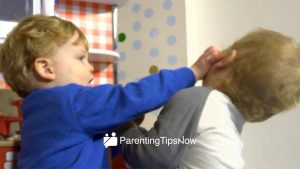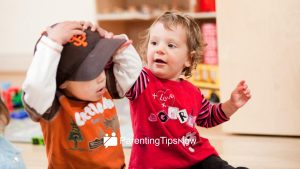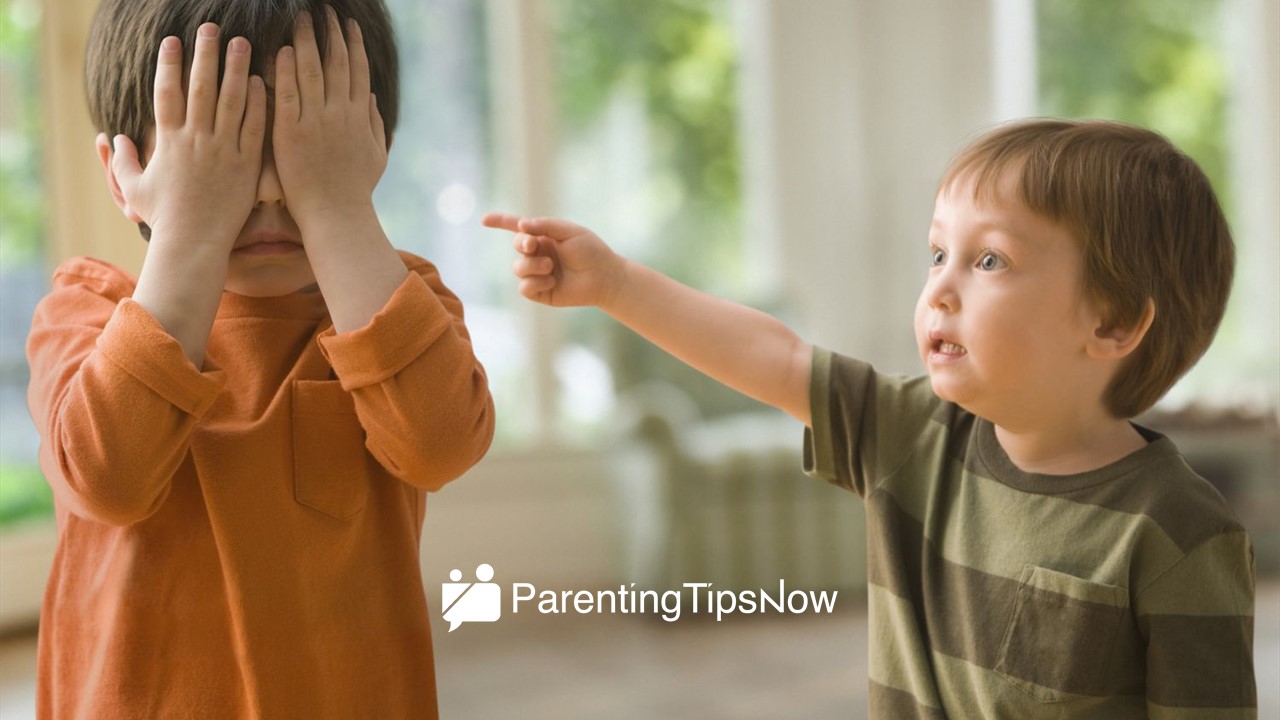Table of Contents
ToggleAs a parent of a toddler, hitting is likely one of the behaviors that you are most concerned about. Unfortunately, hitting is a normal part of development for children in their toddler years. While it can be difficult to watch your little one hit, it’s important to understand the implications that come with this behavior and what parents can do to address it properly. This article will discuss the impact of toddler hitting and provide parents with insight into how best to navigate this challenging stage of development.
Learn what parents need to know about their toddler’s hitting and the impact it can have. Find helpful tips and advice to help your child manage their emotions in a healthy way.
The Impact Of Toddler Hitting
Toddler hitting is a common behavior in young children. It occurs when they lash out with their hands, feet, or any other body part to express anger, frustration, or exhaustion. It usually begins between the ages of 1-3 and can be worrying for parents who may feel helpless in trying to stop it.
Most experts agree that toddler hitting is a normal stage of development as young children learn to express themselves and explore their environment. While it can be difficult for parents to witness, especially when directed towards siblings or other kids at daycare, there are strategies that can help minimize it over time. Understanding why your child might be acting out will go a long way in helping you respond in an appropriate manner.

Toddler Hitting Effects On Development
One of the most common behavioral issues for toddlers is hitting. Toddler hitting can have profound and lasting effects on a child’s development, so it should be addressed early on. It is important to understand why toddlers hit and what can be done to help them develop in positive ways.
Hitting typically starts around age one when a toddler tries to express their emotions by using physical behavior instead of words. While this may seem harmless, it can lead to frustration, aggression, and poor social skills if not addressed quickly. Additionally, research has shown that the earlier a child hits, the longer the behavior may last into childhood and adolescence.
It is important for parents to take an active role in teaching their children how to express themselves in healthy ways while also setting firm boundaries against hitting.
Causes Of Toddler Hitting
Toddler hitting is a behavioral issue faced by many parents. It can be an upsetting and confusing experience, especially when your toddler is too young to explain why they’re behaving in such a manner. At the same time, it can feel like a daunting issue to tackle; understanding the causes of toddler hitting may help parents find effective solutions.
They Lack Impulse Control
The root cause of toddler hitting is typically a lack of self-control that comes with age. Many toddlers do not have the emotional maturity needed to manage their feelings when they become upset or frustrated. They may lash out by slapping, kicking, or pushing as a form of expression when they are unable to communicate verbally yet. Affectionate physical contact like hugs and kisses can also be difficult for some children who lack impulse control, and they may hit instead.
They Don’t Know It’s Bad
Unfortunately, most of the time, these children do not understand that hitting is bad and that there are better ways to express themselves. Toddler hitting can be caused by a variety of things, such as frustration or anger over something they cannot control or understand. Young children are still learning right from wrong and sometimes hit because they have yet to learn the difference between acceptable and unacceptable behaviors. Additionally, some kids hit because they do not yet have fully developed communication skills; they may become overwhelmed with emotion and resort to physical aggression instead of verbal expression like adults would do.
They Are Testing Limits
According to experts, toddlers are hitting as they test the limits of their newfound independence and strength. Toddlers may hit out of frustration or anger due to limited communication skills. They may feel overwhelmed by emotions that they can’t yet express with words. In addition, toddlers may be testing boundaries by hitting in order to see what response it elicits from adults in their lives. This toddler hitting also provides an outlet for children who are feeling powerless against the authority of adults and siblings.
They Don’t Know How To Process Feelings
One of the primary causes of toddler hitting is they don’t know how to process their emotions properly. Young children are often overwhelmed by strong feelings such as anger and frustration, which can lead them to lash out physically. Parents should remember that toddlers aren’t born with an emotional toolkit, so it’s important for them to teach their kid’s healthy ways to express themselves. This could include teaching them words for different emotions or modeling positive behaviors when faced with difficult situations.
Emotional Impact Of Toddler Hitting
When toddler hitting happens, it can have an immense emotional impact on the family. Not only is it frustrating for parents and caregivers when a child hits, but their own feelings of guilt and shame can grow from these moments. This kind of behavior often leads parents to question whether or not they are doing something wrong in the way they are parenting their children. It’s important for families with toddlers who are hit to understand that this behavior is normal developmentally and that there are steps they can take to help guide their children through this stage.
The emotional impact of toddlers hitting can be serious and long-lasting. When a young child experiences aggressive behavior or gets hit by another toddler, it can be emotionally scarring for them. As parents, it’s important to understand the short and long-term consequences of toddlers hitting. When a child is on the receiving end of physical aggression from another toddler, they are likely to feel scared, insecure, and helpless, all feelings that can have a lasting negative effect on their development.
Strategies To Address Toddler Hitting
Hitting is a common behavior in toddlers and can be an incredibly difficult behavior to manage. But it’s important for parents to remember that there are many strategies available to address toddler hitting and that, with some patience and understanding, it’s possible to help your child learn healthier ways of communicating their needs. Identifying the cause or triggers behind the behavior is essential when developing an effective strategy for managing hitting in toddlers.
Understanding why a toddler might hit could be rooted in a lack of verbal skills or even something they are struggling with emotionally or mentally. By exploring potential causes, parents can develop more tailored approaches that seek to address underlying issues rather than just hoping the problem will disappear on its own. This includes creating consequences that fit the specific issue at hand as well as implementing positive reinforcement techniques like rewards and praise when appropriate behavior is displayed.
Toddler Hitting Communication Techniques
When it comes to dealing with a toddler who is exhibiting hitting behavior, it is important to know the best communication techniques. It is vital for parents and caregivers to stay level-headed and remain consistent when addressing this type of behavior in order to make sure that the child understands their expectations.
There are several things that can be done when a toddler begins hitting, such as redirecting them toward another activity or distracting them in some way. Talking calmly and firmly while explaining why they should not hit can also help communicate expectations. Additionally, making sure that there are consequences for hitting such as time-outs can provide clarity about what will happen if they choose to continue engaging in the behavior.
It is important to remember that consistency with discipline and communication will help ensure that your toddler understands what behaviors are acceptable and unacceptable. With patience, these techniques should bring positive results over time.
Toddler Hitting Physical Intervention Strategies
Toddler hitting is a common issue among parents of young children. It can be a difficult and stressful situation, but there are some strategies that parents can use to help their toddlers stop hitting. Physical intervention strategies involve redirecting the child’s behavior by changing the activity or giving them something else to do with their hands.
For example, if your toddler is hitting you or another person, try removing them from the situation and putting them in a safe timeout spot for two minutes or until they calm down. Acknowledge how your toddler feels about the current situation in order to help him/her understand why it isn’t okay to hit others. Additionally, provide positive reinforcement when your toddler refrains from hitting and make sure he/she knows that you still love him/her even when they misbehave.
Toddler Hitting Positive Alternatives
When it comes to toddlers, hitting can be a common behavior. Unfortunately, this kind of behavior can be concerning for parents who may not know the best way to handle it. The good news is that there are positive alternatives to toddler hitting that parents and caregivers can use to help little ones overcome this negative habit.
One of the key things that parents should keep in mind when dealing with toddler hitting is teaching kids how to express their feelings in more appropriate ways. Offering words like “I’m mad” instead of physical aggression will help kids learn how to self-regulate their emotions better. Parents should also allow children time to cool off and provide them with a calm environment where they are able to practice different coping skills, such as taking deep breaths or counting down from ten.

When To Seek Toddler Hitting Professional Help
When toddlers start hitting, it can be quite alarming for parents. Toddler hitting is a common behavior issue and one that needs to be managed promptly. Parents may find themselves wondering when they should seek professional help with this issue.
It is important to remember that toddler hitting is normal behavior for children at this age and stage of development, but if the behavior becomes frequent or intense, there are several signs parents can look out for, which indicate the need for professional help. If the child’s physical aggression results in injury to another person or pet, or if their hitting continues despite attempts by parents to intervene and stop it, then seeking help from an experienced childcare specialist would be beneficial. Additionally, if the parent notices their toddler has become increasingly frustrated, anxious, or scared when attempting to express themselves verbally then professional help could also be useful here as well.
Final Thoughts: Understanding And Responding To Toddler Hitting
In conclusion, toddler hitting is a common and normal behavior that can be managed with patience and understanding. It is important to remember that toddlers are still developing their language skills and have limited methods of expressing their feelings. By providing a safe and stable environment, responding with empathy, and setting clear expectations, parents can help teach healthy behavior while also fostering mutual respect. Additionally, it is important to remember that although toddler hitting can be challenging; it is an opportunity for parents to practice patience and nurture their relationship with their child.
















